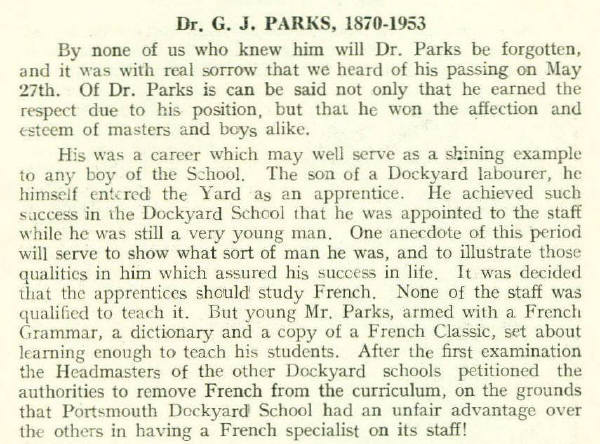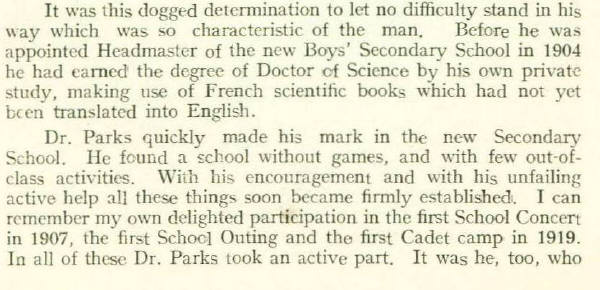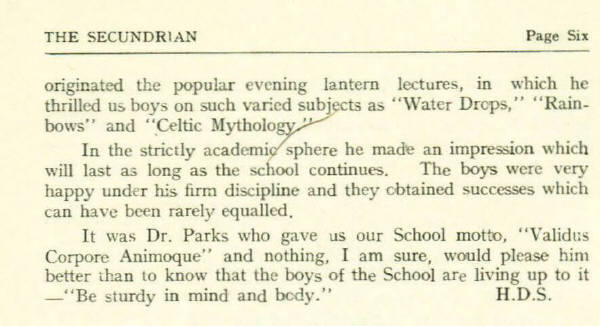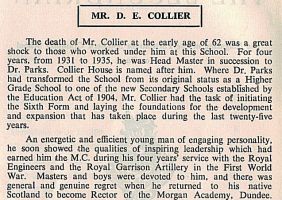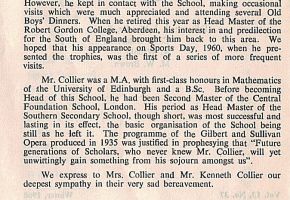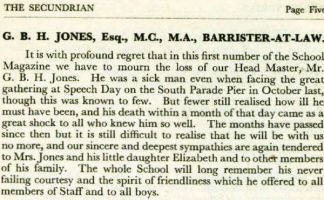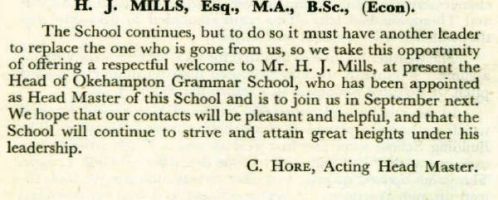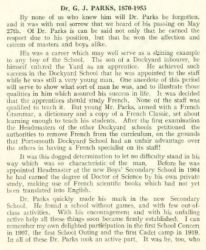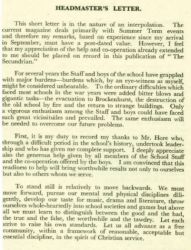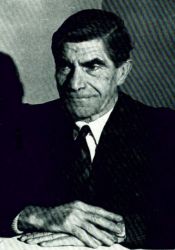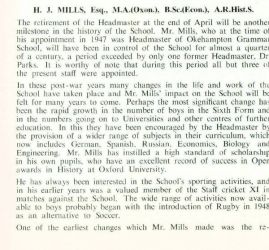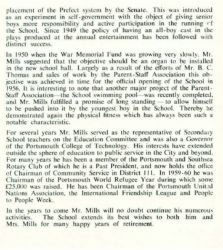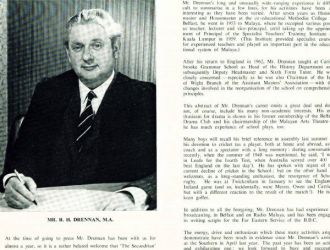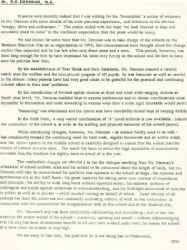The Headmasters
The school had only 7 Headmasters in its 87 years history.

Ernest Walker BSc (1888- 1903) was the school’s first Headmaster and was appointed on October 25 th 1888 with the school opening just 18 days later!
Formerly at Borough Road College he had taken his BSc just two years previously. Mr Walker’s initial staff consisted of Messrs Outlaw [what a name for the pupils to conjure with!!], Eastwood and Jolliffe. A recollection from G.L.Naylor, one of the school’s founding pupils included reference to Mr Walker being one of nature’s gentlemen with a paternal interest in the boys with many school outings being arranged for the boys’ pleasure and instruction. He was also referred to as "stern but kindly".
He dominated the school organising it in an efficient way and impressing his methods and personality on the staff. He would himself inspect all new arrivals in the classroom after allowing them time to settle down and would retain only those who satisfied his own high standards.
Mr Walker had a highly successful period as Headmaster with outstanding results in the 16 years that he was Headmaster despite very significant opposition from various elements of the school board and other school heads (notably in the private sector) – more of that is included in other parts of this website. Undoubtedly though, it was his drive and determination that ensured the very rapid progress that was made and, indeed, the actual continued existence of the school.
Much to the dismay of old pupils and friends of the school Mr Walker announced his intention to resign in September 1903 (Author’s note: I can well imagine that the aggravation that Mr Walker experienced both on behalf of the school and personally – in particular, but not exclusively, from Mr Tuck (see how did it all start) - played some part in his decision to resign. Although only in his early 40s he chose to retire and live a quiet life at Emsworth developing his interest in natural history. He eventually emigrated to Australia where his only son was a doctor.

Dr G.J.Parks D.Sc(Lond) 1904 – 1931 Dr Parks was appointed to the school (at a salary of £300) in December 1903 and took over on 1 st January 1904.
Interestingly, just 2 months later it was decided to form a Girls’ Secondary School and in April the Education Committee advertised for a Headmistress "responsible to the Headmaster" at a salary of £150-£200; Miss A.M Hitchcock being appointed with 8 assistants.
Interestingly, just 2 months later it was decided to form a Girls’ Secondary School and in April the Education Committee advertised for a Headmistress "responsible to the Headmaster" at a salary of £150-£200; Miss A.M Hitchcock being appointed with 8 assistants.
Dr Parks was himself a Portsmouth boy and had entered the Dockyard at the age of 14 where he spent 5 years as an apprentice before transferring to the Admiralty Experimental station at Haslar where he carried out research work. Two years later he gained first place in a Civil Service examination to become an Assistant Master at the Dockyard School. He remained there for twelve years working in his spare time for a BSc degree which he obtained with 1 st Class honours and the Degree of Doctor of Science.
He was mindful of the need for a school life no longer confined to academic work and recorded his view in the school concert programme in 1909 that the value of school work should not be wholly measured by the examinations passed; this was, indeed, a somewhat risqué view in those days and drew disapproval in some quarters. During this same period Dr Parks distributed an Address to the boys. There is much to it but he refers to the importance of "being strong in your body, to go about the duties of life and to resist disease; strong in intellect, to shun ignorance and folly and narrow prejudice; strong in soul through a living and practical faith in God that you may conquer wickedness and stand for righteousness and purity of life both in yourself and in any community to which you belong." He encourages boys to concern themselves with bodily health and strength so that they may build a future worthy of the past. He includes some elementary rules on hygiene and advises plenty of recreation in the open air – including organised games. He warns boys against facile pleasures, bad company and vulgarity of interests recommending the pursuit of good music and the enjoyment of good literature. Finally he stresses the value of discipline, unselfishness, loyalty and "esprit de corps" the need to uphold the good name of the School and to support school enterprises. [Author’s note. Application of these values would not go amiss in society some 100 years later]. It is not difficult to identify from this where the school motto – Validus Corpore Animoque - emanated.
Dr Parks set himself four tasks. First, to mitigate the severity of discipline that had been somewhat harsh in the Higher Grade School. Second, to reduce the size of classes (helped by the building extensions of 1911). The final two tasks were to regularise the method of entry and to lengthen the school life – this was achieved despite opposition from various quarters; he sought to do this by lowering the age of entrance to 11 and raising the leaving age. Between 1895-1905 the average school life was one year and nine months but by persuading the Admiralty to raise the age of entry to the Dockyard from 14 to 15 (conceded in 1915) this gave a boy on the "non Latin side" a four year school life.
Under Dr Parks the school flourished. Academic results excelled, sports activities increased, operatic productions became hugely successful and became a focus not only for those with school links but in the wider community too and school trips became a valued and regular feature of school life.
Dr Parks was affectionately regarded by thousands of old boys and staff alike and there is no doubt that the school owed a great debt to him.
Dr Parks retired on 31 July 1931 after nearly 28 years as Headmaster. He died in 1953.

Mr D E Collier MC MA BSc 1931- 1935 Mr Collier was appointed as Headmaster in succession to Dr Parks.
He had graduated as a MA with First Class Honours from the University of Edinburgh and had served for 4 years in the Royal Engineers and the Royal Garrison Artillery during which time he won the MC. He had previously been Second Master at the Central Foundation School London.
Mr Collier’s task was to reorganise the school as an up-to-date Secondary School and in particular to establish the Sixth Form course. His reorganisation in the principles of the timetable and curriculum, the division of the day and the ordering of examinations remained basically unchanged for the rest of the school’s life. PT and teaching of music (albeit only in the first year) were introduced and prefects appointed. Clubs and other activities continued to flourish and school camps became an annual activity after 1933.The extension of games meant that by 1934 as many as 300 boys were regularly playing football on a Saturday morning.
Academic results also continued to excel. Regretfully, Mr Collier left the school in 1935 to supervise the Morgan Academy, Dundee in his native Scotland. In his short stay, Mr Collier had gained the admiration and loyalty of all in contact with him.

Mr G B H Jones MA 1935 – 1946 Mr Jones was a graduate of Sidney Sussex College Cambridge to which he had won an Open Exhibition in History.
He was a Barrister-at-Law of Gray’s Inn and during his service as a Lieutenant in the Welsh Horse in the First World War had been awarded the MC. He had previously been Senior History Master at Emmanuel School, Wandsworth. Mr Jones was thoughtful, scholarly, had a human approach and an unassuming manner with an authoritative friendliness. He was religious and introduced regular assemblies. He loved music, encouraged the development of the Music Society and enthusiastically supported the Annual Entertainment. He encouraged the development of school dramatics because he foresaw that eventually they would have to replace the operas that had been so successfully run for many years.
It fell to Mr Jones to see the School through the difficult years of evacuation to Brockenhurst and the return to Portsmouth in 1944. On November 22 nd 1946 the school was shocked to hear the news that Mr Jones had died. He had been absent for only a few days and few knew the seriousness of his illness. Staff and boys had looked upon him as a friend and he was sadly missed.

Mr H J Mills MA BSc (Econ) 1947-71 At the time of his appointment Mr Mills was Head of Okehampton Grammar School.
He took over a much larger school in a very different area – particularly in the immediate post war era when Portsmouth was still coming to terms with the huge assault that it had suffered in the War and there was a deal of comparative poverty in the City. He had had interesting non-academic experiences too including broadcasting in Australia and gold prospecting in both South Arabia and Australia (he was known to comment that he "just looked in the wrong places"!)
Mr Mills came with very clear ideas of what life in a large grammar school should be like. The second issue of The Secundrian contained a letter from Mr Mills outlining his policy: "We must move forward, pursue our mental and physical disciplines diligently, develop our taste for music, drama and literature, throw ourselves wholeheartedly into school societies and games but above all we must learn to distinguish between the good and the bad, the true and the false, the worthy and the tawdry. Let us each strive to raise his own standards. Let us all advance as a free community, within a framework of Christian service". (Ed: In my experience policy statements are frequently forgotten when the going gets tough but from my personal knowledge I can vouch that all elements of Mr Mills’ policies were religiously adhered to).
When he arrived at the school its winter sports focus was soccer but Mr Mills, being a rugby man himself, introduced rugby as an alternative in 1948 and the "Phoenix RFC" (a reference to the phoenix in the school badge and its link to the new school coming from the flames of the old one burnt down in the war) was born. With the boys having no kit to wear and in an age of austerity, Mr Mills personally visited a RAF establishment in Southsea and returned with some redundant rugby kit – the result being happiness all round!
Mr Mills established a War Memorial Fund in 1947. Perturbed by the slow growth of the fund introduced Sales of Work. These were highly successful and Mr Mills then suggested a memorial organ for the new school hall. A memorial Compton pipe organ and a memorial plaque were purchased and installed as planned with the organ being used daily at morning assemblies.
Mr Mills had a very strong presence and a robust appearance – being not dissimilar in his physical appearance to the actor Robert Beattie. Ed: I can well recall the first time I saw him when, as an 11 year old, I saw him sweep into the assembly hall with his gown flowing behind him; there was an audible gasp from the new boys few of whom would, from that moment in time, dream of playing up this man!! I can well remember, too, the few occasions when he took our form for Latin and the total attention that he obtained from all boys (whoever needed a cane when a man like HJM was about!). In practice he was a kind and thoughtful man and highly supportive of sports, drama and music activities. An example of his kindness and generosity (not known by most) was that in times of austerity in Portsmouth he kept a suit at home which he would loan to boys who did not own one and whose parents could not afford one but who were to attend important interviews; as if that were not enough there would usually be a few pounds in the pocket for the boy too!
He, personally, was a keen swimmer and took pride in swimming in the sea every day of the year. One of his particular projects was to raise sufficient funds for the school to have its own swimming pool; this was duly achieved and the occasion was marked by the smallest boy in the school (John Farrell) having the honour of pushing the Headmaster into the pool! Pupils and staff alike were, indeed, very fortunate to have such a man as their leader.

Mr R H Drennan MA 1971 – 1974 Mr Drennan was a graduate of Trinity College Dublin where he read History. He had attended the Boys’ Model Primary School in Belfast before transferring to the Royal Masonic School in Dublin. Immediately prior to taking up his appointment at the Southern Grammar he had been Deputy Head of Carisbrooke Grammar School on the Isle of Wight – a school in which he had previously taught history.
Following upon Mr Mills who had served the school so well for 24 years was a difficult challenge but Mr Drennan set to. It was to be his misfortune that due to changes in government policy the school enjoyed only three years under his stewardship before becoming a comprehensive – three years that were to be marred by much acrimony and ill feeling from parents, pupils and staff regarding closure of the grammar school.
Mr Drennan’s goals were to ensure that all of the pupils should fulfil their potential and at the same time enjoy their schooldays in a hardworking and well ordered environment. He, personally, gave great encouragement and assistance to academic high-flyers – reflected in a comment by one former pupil who said that he would never have had the confidence to apply (and gain entry) to Oxbridge had Mr Drennan not insisted that he should and then spent hours coaching him – resulting in a career as an eminent lawyer. He was, however, also highly mindful of those at the other end of the academic spectrum. Entry to the school had gradually become easier in latter years with a ratio of some 1:3 gaining acceptance compared to a national average of 1:5; this had resulted in some boys not being equal to the demanding requirements of the General Certificate of Education qualifications and so Mr Drennan introduced the opportunity to take the less demanding Certificate of Secondary Education qualification – something that Mr Mills had previously strongly resisted.
Other changes introduced by Mr Drennan included the advent of pastoral Heads of Year (which saw the gradual decline of the House system), far more structured careers advice and a move towards a more "socially educative" assembly with reduced focus on religious aspects. Mr Drennan also discontinued the requirement to wear the school cap - although the remainder of the uniform remained compulsory – and banned caning (no doubt to the great relief of subsequent miscreants!!).
Mr Drennan gave enthusiastic support to the sports teams and drama; he had, himself been a very good cricketer and rugby player and he had previously been Chairman of the Malayan Arts Theatre when he served with HM Overseas Service in the 1950s and 1960s in a teaching and training capacity.
He was considered to be a colourful character – reportedly referred to as a "Stage Irishman" at times. A convivial character with a strong personality and full of energy, he enjoyed lively conversation. He had no fear of being disliked by erring pupils or staff or Education Authority bureaucrats all of whom got short shrift.
Mr Drennan left the Southern Grammar in 1974 as closure loomed and with it its transformation to a comprehensive. He was, personally, very sad to see the closure of grammar schools but pragmatic in the hope that academic standards would be preserved. He then became (short term) headmaster of the Northern Grammar (Boys and Girls) before it, too, became a comprehensive in 1975 when he took over as head of the new school (Mayfield). He subsequently became Chairman of the Hampshire Secondary Schools Association and then Principal of the Portsmouth V1th Form College (a return to the SGS Baffins building). In 1988 he retired aged 64.
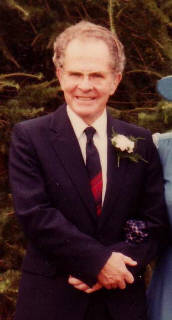
Mr H Williams 1974-75 Harold Williams had joined the school in 1950 as an English teacher and had been Head of English for many years before being promoted to Deputy Headmaster under Mr Drennan.
In 1974 he took over as Headmaster until the school’s closure in the summer of 1975 – a thankless task due to the huge amount of ill feeling that existed because of the closure decision. There was much acrimony from staff who had served the school for so many years and who, now, had to apply for jobs elsewhere; from parents who felt strongly that their sons’ education was being unreasonably blighted and from the pupils themselves who were now to face a fundamental change in their schooling.
Not surprisingly, there were no further significant changes in the running of the school during Mr Williams’ tenure – the run down towards its demise was quite enough to cope with.
During the 1960's & early 70's he had directed the highly successful annual drama productions, including Julius Caesar, The Marriage of Figaro, The Barber of Seville, Henry IV Part 1 (with TV actor David Calder [then David Taylor] as Prince Hal), Macbeth, An Enemy of the People, The Tempest, Coriolanus, The Servant of Two Masters.
When the school closed in 1975 he moved to the newly-created Mayfield School, working again with Mr Drennan, as Deputy Head. He also became a Portsmouth City magistrate. He retired in 1985, He lived in Whitehill, Hants, until his death in 1996.There is a plaque commemorating him and his wife on one of the benches near Southsea Castle.
See, also, his speech to the Old Secundrians dinner in 1975
